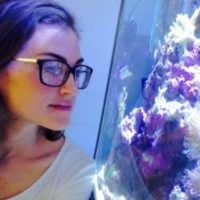Kate M. Quigley
PhD candidate
BSc. Biology (University of Texas-Austin, 2008), MSc. Marine Biology (James Cook University, 2013)
James Cook University
katemarie.quigley@my.jcu.edu.au

From 2005 to 2022, the main node of the ARC Centre of Excellence for Coral Reef Studies was headquartered at James Cook University in Townsville, Queensland (Australia)








PhD candidate
BSc. Biology (University of Texas-Austin, 2008), MSc. Marine Biology (James Cook University, 2013)
James Cook University
katemarie.quigley@my.jcu.edu.au
Kate was born and raised in southern Spain, but has lived in a number of countries including Italy, Cuba, the United States, and Peru. She completed her BSc in Biology in the United States, where an invertebrate biology class inspired her interest in symbiosis. After two and a half years living in the Andes of Peru working for the Peace Corps, she decided to move to a warmer climate and pursue a Masters at James Cook University in Australia. Kate continued on to a PhD at James Cook University and the Australian Institute of Marine Sciences, where she is currently using quantitative genetics to understand the coral-dinoflagellate symbiosis.
Project Title:
Molecular and environmental basis for Symbiodinium specificity in the coral dinoflagellate association
Project Description:
Symbiotic interactions are of fundamental importance to the ecology of many organisms through their impact on host reproduction, behaviour and co-evolution. The purpose of my PhD research is to quantify the extent to which the coral host determines the community structure of their photosymbiont community (Symbiodinium sp.) in the early life stages of corals. I also assess the contribution that environmental availability of different Symbiodinium types has on the composition of Symbiodinium communities established in coral juveniles. Quantitative genetics, Next-Generation Sequencing and RNA-sequencing allow for an in-depth look at Symbiodinium community structure and the genetic architecture that underpins this symbiosis. Results will evaluate the flexibility and specificity of the Symbiodinium-coral association and the biological feasibility of changes in symbiont types for rapid acclimation or selection to environmental change. By quantifying and identifying genetic mechanisms controlling the Symbiodinium community, we can assess if community changes may provide an avenue for corals to acclimatize and adapt to a changing climate.
Supervisors:
Principle supervisor: Prof. Bette Willis (JCU)
Supervisory committee: Dr. Line Bay (AIMS), Dr. Bill Leggat (JCU)
Publications List:
Quigley, KM., Davies, SW., Kenkel, CD., Wllis BL., Matz MV., Bay LK. “Deep-sequencing method for quantifying background abundances of Symbiodinium types: exploring the rare Symbiodinium biosphere in reef-building corals.” PloS one 9.4 (2014): e94297.
Bauer, KK., Abbott, JC., Quigley KM. “Collared Peccary (Pecari tajacu) in Bastrop County, Texas.” The Southwestern Naturalist 55.1 (2010): 138-139.
Conference Presentations:
Quigley, KM., Davies, SW., Kenkel, CD., Wllis BL., Matz MV., Bay LK. “Deep-sequencing method for quantifying background abundances of Symbiodinium types: exploring the rare Symbiodinium biosphere in reef-building corals. Australian Coral Reef Society Annual Meeting, Sydney, August 2013, Poster
Awards and Grants:
Endeavour International Postgraduate Research Scholarship and James Cook Postgraduate Research Scholarship. AUD$56,653 per annum
AIMS@JCU Pilot Research Award 2012. AUD$750
Winter School in Mathematical & Computational Biology Bursay 2014. AUD$350
New DNA techniques are being used to understand how coral reacted to the end of the last ice age in order to better predict how they will cope with current changes to the climate. James Cook Univer
A new study on the effects of climate change in five tropical countries has found fisheries are in more trouble than agriculture, and poor people are in the most danger. Distinguished Profess
James Cook University researchers have found brightly coloured fish are becoming increasingly rare as coral declines, with the phenomenon likely to get worse in the future. Christopher Hemingson, a
Researchers working with stakeholders in the Great Barrier Reef region have come up with ideas on how groups responsible for looking after the reef can operate more effectively when the next bleaching
Abstract: As marine species adapt to climate change, their heat tolerance will likely be under strong selection. Individual variation in heat tolerance and its heritability underpin the potential fo
Abstract: The Reef Ecology Lab in KAUST’s Red Sea Research Center explores many aspects of movement ecology of marine organisms, ranging from adult migrations to intergenerational larval dispersal
Abstract: Macroalgal meadows are a prominent, yet often maligned component of the tropical seascape. Our work at Ningaloo reef in WA demonstrate that canopy forming macroalgae provide habitat for ad
Abstract: Sharks are generally perceived as strong and fearsome animals. With fossils dating back at least 420 million years, sharks are not only majestic top predators but they also outlived dinosa
Abstract: Connectivity plays a vital role in many ecosystems through its effects on fundamental ecological and evolutionary processes. Its consequences for populations and metapopulations have been
Abstract: Evolution of many eukaryotic organisms is affected by interactions with microbes. Microbial symbioses can ultimately reflect host’s diet, habitat range, and even body shape. However, how
Abstract: The past few years have seen unprecedented coral bleaching and mortality on the Great Barrier Reef (GBR) but the consequences of this on biodiversity are not yet known. This talk will expl